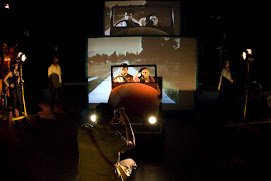I’ve entered one of those dreaded, worst nightmare situations—well perhaps not worst nightmare, but definitely one of those situations I think we all fear as playwrights and scriptwriters. You’ve been commissioned, given what appears to be an open brief to decide story, characters, style, form, structure, blah, blah, blah, you write a first draft that you’re reasonably happy with, and send it off. So far so good. Until you get the producer’s response, and discover that they don’t like any of your choices. Although they don’t express it quite so bluntly, in essence they want a completely different script from the one you’ve written. Your day, which had started off so well, crashes.
My first thought—fortunately not acted on—is to dash off an email saying something along the lines of: Thank you for your email. We obviously have very different sensibilities and ideas, so let’s cut the crap and call it a day. My second, slightly calmer, thought is to remind myself to thank God I don’t work in film or TV where this sort of scenario would be commonplace. The third thought is that this is a paid gig, I’m a professional writer, sometimes this comes with the territory, so suck it up.
Two days later I arrive at thought number 4, which is a mash up of the above: I need to make this writer/producer relationship work. This will involve finding a way to accommodate (some of) the producer’s feedback and suggestions, whilst hanging onto as much of my original script as possible. Will the resulting script be better? Suffice it to say: it will have the producer’s breath all over it.
17 August 2008
27 July 2008
That Development Sceptic Again
It’s been so long since I’ve posted that I’d forgotten my password. But have been flat out with radio works for the ABC and BBC, Taishō Chick, a cabaret script for Asako Izawa and the Art Gallery of NSW, poetry, and the script of Disappearance for The Border Project. Then out of the blue 7-ON received a grant from the Theatre Board of the Australia Council for the first stage development of our adaptation of Nietzsche’s Thus Spoke Zarathustra, which we are doing with the School of Music & Drama at Wollongong University. No reflection on our grant-writer’s skill, but none of us for a moment expected that application to be successful, so it wasn’t factored it into our work schedules … Anyway, that’s the reason for the long gap between this and my last post …
Have been intending to expand my thoughts on play/script development for ages, and a recent e-newsletter from Playwriting Australia, and a conversation with a colleague, reminded me of that. This colleague’s experience with the ‘free-floating’ dramaturgy/workshopping offered by script development agencies was remarkably similar to mine with Songket. At some point after our workshops, we both reverted to versions of the plays that were pretty close to the drafts we entered the workshop with. I doubt we are the only writers who have done this—which begs the question: what is the value of such programs for writers?
Should clarify here that I am absolutely in favour of the creative development and workshopping of new work—with the company and collaborators who are committed to producing the piece. What I am less enthusiastic about are the various script development programs and agencies who are in on the act. Film has a whole host of development initiatives, most of which seem to exist to (a). provide an income stream for assessors, script editors, program directors, administrators and others, presumably while they try to get their own projects up, (b). generate activity and create the illusion that your project/screenplay is progressing, and (c). to explain why things can’t or won’t happen. i.e. why your screenplay won’t get funded or produced. To what extent is this the case with theatrical script development organisations? Despite the skills and best intentions of the personnel involved, I’d say: to a quite considerable extent.
Richard Nelson’s address, (see link in my 19 December 2007 post), eloquently expresses a lot of my concerns about not just the practices of script development agencies, but also raises important questions about their underlying philosophy. So I’m not going to reiterate them here. Instead let’s consider the alternatives. What if these script development agencies didn’t exist? What if the money currently channelled into these bodies were available for small-scale productions of new writing? And by this I mean writing across a whole spectrum of performance contexts and styles, from straightforward storytelling to wild experiments with form, structure and language. Moreover, it’s not only writers who would benefit from this, but directors and actors as well. Directors because they would be exposed to a much bigger range of writing, and through that develop not only the skills, but also, importantly, the willingness to tackle those interesting and idiosyncratic scripts that all too easily get dismissed as ‘too difficult’ or ‘impossible to stage’.
Nothing beats production. No amount of round-the-table dramaturgical discussion, readings or workshops can possibly teach you as much about writing for performance as collaborating on a production and seeing your work in front of an audience. As a playwright of many years’ experience, I have come to the conclusion that the best way to support new writing is to produce new work—across a range of performance and production environments. To paraphrase New York company 13P: Don’t develop plays, do them!
OK, we need to see our work up—but in a context appropriate for a new script’s first public outing. A kind of first draft production/season, with modest production values, cheap ticket prices, and publicity kept suitably low-key. Is this a writers’ theatre? Yes and no. Yes, because the focus is firmly on the development of new writing, and no because I’m absolutely not suggesting setting up yet another administrative infrastructure topped by an Artistic Director or CEO. (We're not children, and I think many of the prevailing structures—unintentionally, no doubt—infantalise us.) What I think I’m after is something much more grass roots, much looser and far more flexible. Something able to move swiftly, a quick response scheme, perhaps?
Taishō Chick was written, rehearsed and had its first performance within the space of about 5 weeks. While I wouldn’t want to create all my work this way, it was an exhilarating experience. The energy and enthusiasm that sparked the piece wasn’t lost in ‘development hell’, and I’m refining the script as it is being performed. This is also possible because there are no reviewers or critics invited to pass judgement on this initial season, and the marketing and PR has been minimal and about providing simple information rather than hype.
Have been intending to expand my thoughts on play/script development for ages, and a recent e-newsletter from Playwriting Australia, and a conversation with a colleague, reminded me of that. This colleague’s experience with the ‘free-floating’ dramaturgy/workshopping offered by script development agencies was remarkably similar to mine with Songket. At some point after our workshops, we both reverted to versions of the plays that were pretty close to the drafts we entered the workshop with. I doubt we are the only writers who have done this—which begs the question: what is the value of such programs for writers?
Should clarify here that I am absolutely in favour of the creative development and workshopping of new work—with the company and collaborators who are committed to producing the piece. What I am less enthusiastic about are the various script development programs and agencies who are in on the act. Film has a whole host of development initiatives, most of which seem to exist to (a). provide an income stream for assessors, script editors, program directors, administrators and others, presumably while they try to get their own projects up, (b). generate activity and create the illusion that your project/screenplay is progressing, and (c). to explain why things can’t or won’t happen. i.e. why your screenplay won’t get funded or produced. To what extent is this the case with theatrical script development organisations? Despite the skills and best intentions of the personnel involved, I’d say: to a quite considerable extent.
Richard Nelson’s address, (see link in my 19 December 2007 post), eloquently expresses a lot of my concerns about not just the practices of script development agencies, but also raises important questions about their underlying philosophy. So I’m not going to reiterate them here. Instead let’s consider the alternatives. What if these script development agencies didn’t exist? What if the money currently channelled into these bodies were available for small-scale productions of new writing? And by this I mean writing across a whole spectrum of performance contexts and styles, from straightforward storytelling to wild experiments with form, structure and language. Moreover, it’s not only writers who would benefit from this, but directors and actors as well. Directors because they would be exposed to a much bigger range of writing, and through that develop not only the skills, but also, importantly, the willingness to tackle those interesting and idiosyncratic scripts that all too easily get dismissed as ‘too difficult’ or ‘impossible to stage’.
Nothing beats production. No amount of round-the-table dramaturgical discussion, readings or workshops can possibly teach you as much about writing for performance as collaborating on a production and seeing your work in front of an audience. As a playwright of many years’ experience, I have come to the conclusion that the best way to support new writing is to produce new work—across a range of performance and production environments. To paraphrase New York company 13P: Don’t develop plays, do them!
OK, we need to see our work up—but in a context appropriate for a new script’s first public outing. A kind of first draft production/season, with modest production values, cheap ticket prices, and publicity kept suitably low-key. Is this a writers’ theatre? Yes and no. Yes, because the focus is firmly on the development of new writing, and no because I’m absolutely not suggesting setting up yet another administrative infrastructure topped by an Artistic Director or CEO. (We're not children, and I think many of the prevailing structures—unintentionally, no doubt—infantalise us.) What I think I’m after is something much more grass roots, much looser and far more flexible. Something able to move swiftly, a quick response scheme, perhaps?
Taishō Chick was written, rehearsed and had its first performance within the space of about 5 weeks. While I wouldn’t want to create all my work this way, it was an exhilarating experience. The energy and enthusiasm that sparked the piece wasn’t lost in ‘development hell’, and I’m refining the script as it is being performed. This is also possible because there are no reviewers or critics invited to pass judgement on this initial season, and the marketing and PR has been minimal and about providing simple information rather than hype.
11 March 2008
More From The Development Sceptic
Of several pitfalls I see in a lot of script development initiatives, 2 of the most significant are (a). pushing the work to fit the needs of the organisation’s or program’s development process, and (b). pushing the work to conform to existing templates and expectations at the expense of its distinctiveness or originality. Why does this happen? Perhaps because once a company or organisation settles on an agenda, or into a particular way of working, it runs the risk of imposing comfortable strategies on recalcitrant material—or writers.
While I gather more thoughts on script development programs, here are Nineteen Hopes For An Activist Cinema from the UK magazine Vertigo. I find they translate easily to theatre and performance. See what you think.
While I gather more thoughts on script development programs, here are Nineteen Hopes For An Activist Cinema from the UK magazine Vertigo. I find they translate easily to theatre and performance. See what you think.
29 January 2008
What Makes a Character?
‘A great deal of nonsense is written about characters in fiction—from those who believe too much in character and from those who believe too little. Those who believe too much have an iron set of prejudices about what characters are: we should get to “know” them; they should not be “stereotypes”, they should “grow” and “develop”; and they should be nice. So they should be pretty much like us. A glance at the thousands of foolish “reader reviews” on Amazon, with their complaints about “dislikeable characters”, confirms a contagion of moralising niceness. Again and again, in book clubs up and down the country, novels are denounced because some feeble reader “couldn’t find any characters to identify with”, or “didn’t think that any of the characters grow.”’ James Woods, A life of their own, The Guardian, 26 January 2008.
I’m with James Woods on this; the reason I find Brecht’s character Mother Courage interesting is because despite all that happens to her, she doesn’t change—or ‘grow’.
Anyway, as I work on script segments for Disappearance, and Fearless N goes into rehearsal, I’m still thinking about this whole vexed issue of script development; trying to articulate why I have such profound misgivings about ‘free-floating’ script development programs and initiatives.
Interestingly enough, both Disappearance and Fearless N have been developed with the companies and collaborators committed to the productions, and in ways that don’t focus exclusively, or even primarily, on the written text. Instead, creative development periods have been used to progress the design, explore sound and musical ideas, and try out various approaches to performance. Discussions have dealt not only with the written component, but with the interaction of all the works’ theatrical elements.
Will post some more thoughts on script development soon.
In the meantime, here’s the link for James Wood’s article about character/s. Although he’s talking about characters in literary fiction, his comments offer food for thought to playwrights, dramaturgs, and anyone involved in the ‘script development’ industries.
I’m with James Woods on this; the reason I find Brecht’s character Mother Courage interesting is because despite all that happens to her, she doesn’t change—or ‘grow’.
Anyway, as I work on script segments for Disappearance, and Fearless N goes into rehearsal, I’m still thinking about this whole vexed issue of script development; trying to articulate why I have such profound misgivings about ‘free-floating’ script development programs and initiatives.
Interestingly enough, both Disappearance and Fearless N have been developed with the companies and collaborators committed to the productions, and in ways that don’t focus exclusively, or even primarily, on the written text. Instead, creative development periods have been used to progress the design, explore sound and musical ideas, and try out various approaches to performance. Discussions have dealt not only with the written component, but with the interaction of all the works’ theatrical elements.
Will post some more thoughts on script development soon.
In the meantime, here’s the link for James Wood’s article about character/s. Although he’s talking about characters in literary fiction, his comments offer food for thought to playwrights, dramaturgs, and anyone involved in the ‘script development’ industries.
Subscribe to:
Posts (Atom)
+Photo+Leah+McGirr+3.jpg)



